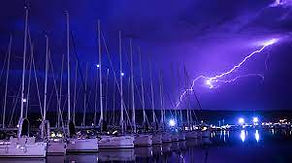Understanding the risks of lightning at sea.
1. There are several types of electrical discharge at sea.

Direct electrical discharge:
Very serious, it destroys all the equipment and causes a major fire hazard.
Indirect electrical discharge:
When lightning strikes water and travels up the surrounding electrical installations, it causes a major surge in all the electrical installations.
Electromagnetic waves :
Generated by lightning, this electromagnetic wave creates interference and affects all types of electronic equipment.
2. What damage can be done to a vessel?
Lightning releases a large amount of energy in the form of heat and electricity.
When it strikes a ship, the energy can be intense enough to cause structural damage.


Very high fire risk:
- If you encounter a poor conductor such as fibreglass, wooden partitions or a teak deck, the heat will literally atomise any obstacles in its path, causing a fire.
Major structural damage:
- Deformation of the hull and keel.
- Deformation of the mast and shrouds.
- Visible cracks and holes in the vessel.

3. Consequences for electronic equipment.
Lightning can damage a wide range of electrical equipment, particularly but not only those with wired connections.
The electromagnetic wave generated on impact can render the following equipment obsolete:
- Navigation equipment damaged: VHF, radio, radar, GPS, anemometer, etc.
- Failure of the onboard computer and autopilot.
- Burnt electrical panel and fuses.
- Starter relay and alternator failure.
- Inverters and solar panel inverters out of order.
- Battery charger out of order


4. Testimonials from professionals in the Maritime sector.


Dewey Ives, maritime disaster expert and member of Boat. US":
"I've seen a small sailboat moored between two larger ones struck by lightning, and sometimes a motorboat in the middle of a harbour full of sailboats. If lightning strikes your boat, there's not much you can do about it... "
"More than 75% of claims in the US Navy are lightning-related" Almost all of these claims involved damaged electronics. (According to records between 2003 and 2013)
Ocean Today: National Oceanic Atmospheric Administration
"Lightning doesn't strike the ocean as much as it does land, but when it does, it travels over the water using it as a conductor. It can strike nearby boats and electrocute fish near the surface."

